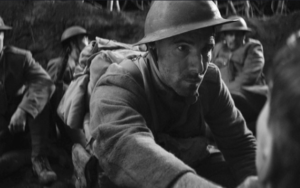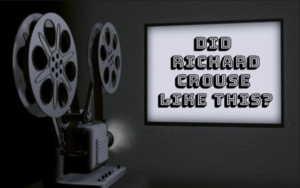 “Foxhole,” a new anti-war film now on VOD, links five soldiers over the course of three conflicts, the American Civil War, World War I and the Iraq War, as they make the kind of life and death decisions that could have far reaching repercussions.
“Foxhole,” a new anti-war film now on VOD, links five soldiers over the course of three conflicts, the American Civil War, World War I and the Iraq War, as they make the kind of life and death decisions that could have far reaching repercussions.
Director Jack Fessenden makes the most of a small budget to bring his film’s inter-generational gimmick to life.
Divided into three vignettes, all ripe with confusion and camaraderie, each segment is shot in a cinematic style that reflects the era in which it is set. From the sepia tone look of the Civil War section and the black and white formalist propaganda film feel of the WWI segment to the more frenetic Iraq War sequence, each is distinguished stylistically.
What connects the multi-generational stories are the actors, who play different characters each time out, and the moral dilemmas faced by them. These sequences are claustrophobic, fraught with danger, volatility and a sense of uncertainty. As these elements swirl, the marooned soldiers are confronted with ethical decisions.
During the Civil War, four Union soldiers must decide whether or not to transport a badly injured Black soldier (Motell Gyn Foster) to the hospital for treatment. The question of the dead or alive value of a German captive is the center point of the Great War vignette while the Iraq War section shows the horror of an ambush.
The actors, Foster, Cody Kostro, Angus O’Brien, Alex Hurt, Alex Breaux, Asa Spurlock and James Le Gros, ably portray the range of honor, sacrifice and camaraderie inherent to the character of a soldier and valiantly work through the script’s wall of dialogue. Still, as wordy and occasionally pedantic as Fessenden’s script is, the ideas buried within are worthy of thought.
Stronger are the visuals. The film is bookended by twin shots that showcase both the futility and inevitability of war. These two shots, set 100 years apart, sum up the film’s anti-war sentiment in stronger “language” than any of the dialogue.
“Foxhole” is an uneven, although audacious and ambitious film, that fares better as provocative purveyor of ideas than a cohesive whole.
 Richard appears on “CTV News at 6” with anchor Andria Case to talk about the best movies and television to watch this weekend. This week he has a look at the surreal “Crimes of the Future,” the psychological thriller “The Righteous” and the audacious war film “Foxhole.”
Richard appears on “CTV News at 6” with anchor Andria Case to talk about the best movies and television to watch this weekend. This week he has a look at the surreal “Crimes of the Future,” the psychological thriller “The Righteous” and the audacious war film “Foxhole.”





